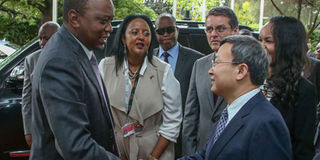Groups want trade barriers removed to spur Africa growth

President Uhuru Kenyatta with China's Vice Minister of Commerce, Wang Shouwen, during the High Level Segment of the 4th China Round Table in Nairobi. President Kenyatta called for the scrapping of unfair trade subsidies. PHOTO | PSCU
What you need to know:
- Speakers at a global trade activists forum were unanimous in their argument that agricultural subsidies by the West should be lifted to create a level trading field.
- As the 10th World Trade Organisation ministerial conference begins Tuesday, Kenya has called on the unfair agricultural subsidies by EU and US to be eliminated.
- Policies by the US and the EU that allow for huge subsidies to farmers also deeply hurt Kenyan products that are traded in their markets.
Kenya and other African countries are being impoverished by protectionist policies adopted by Europe and America under the guise of quality.
This was the general consensus by African countries at the World Trade Organisation Ministerial Conference taking place in Nairobi.
Speakers at a global trade activists forum were unanimous in their argument that agricultural subsidies by the West should be lifted to create a level trading field.
If Kenya is exporting its products to EU, for instance, it must comply with the EU standard requirements, dubbed, ‘Hurdles To Pass (HTP)’.
The hurdles set a number of requirements that agricultural products must meet to cross the border into the EU.
Policies by the US and the EU that allow for huge subsidies to farmers also deeply hurt Kenyan products that are traded in their markets.
The two economies combined subsidise their farmers to the tune of Sh8.6 trillion ($85 billion) annually, an equivalent of Overseas Development Assistant (ODA) to the whole African continent.
UNFAIR SUBSIDIES
As the 10th World Trade Organisation ministerial conference begins Tuesday, Kenya has called on the unfair agricultural subsidies by EU and US to be eliminated.
The developed countries offer domestic support to their farmers as subsidies, damaging Africa’s agriculture and industry.
The rich countries also actively discourage industrialisation in Africa by imposing tariffs on processed products.
They see Africa as a source of cheap raw material and the more processed the product, the higher tariffs.
“If we are to industrialise, tariff escalation and peak tariffs should be eliminated. African economies producing competitively should not be halted with defensive trade remedies. Standards should not be the next frontier of protectionism,” President Kenyatta said at the Fourth China Roundtable meeting on Monday.
UNFAIR SUBSIDIES
The call by President Kenyatta represents that of many African nations whose growth and potential in agriculture have been blocked by uncommon tough trade barriers by developed countries on agricultural commodities.
In the world market, African products cannot compete with other agricultural products (by developed countries) such as cereals, meat, dairy products, sugar, fruit and vegetables, which are heavily subsidised.
Developed nations have placed subsidy supports and trade barriers on their imports to protect their production, following the Great Depression of the 1930s and the Second World War.
Concerns about their agricultural production led them to protect their products posing an unfair ripple effect on trade by African countries.
African countries hope to have a closure on the issue of unfair subsidies at the WTO ministerial conference, which is being held in Africa for the first time.
The subsidies issue has been key in WTO talks since the Doha Round One kicked off in Qatar 14 years ago.
The Doha talks seek a common global trade policy among all 162 member countries.
In terms of restrictive trade practices, the EU at the moment requires African products to comply with its standards on sanitary and phytosanitary measures (SPS).
SPS is a non-tariff barrier blocking African products to EU markets.
It dictates that EU imports goods from disease-free areas, inspected prior to export and not exceed maximum levels of pesticide or insecticide use.
Kenya Institute of Public Policy Research and Analysis argues that despite being presented as a safeguard to the health of its citizens, the barrier exaggerates levels of protection to discourage competition.
African products must also meet set EU requirements on HTP to enter their market.
Fruits and vegetables are exposed to 11 HTPs while fish and its products are exposed to about 10 hurdles to pass.
TOUGH ISSUE
Mr Daniel Omoro, a trade law and policy expert, says there must be a commitment by the ministerial council to eliminate subsidies on developed economies.
“Without such commitments and without actions towards reducing and eliminating these subsidies, market access to African farmers and traders in agricultural products remain a mirage,” he says.
However, Prof Carlos Primo of International Political Economy, argues that without a clear strategy on what next after the lifting of subsidies on developed markets, Africa will not succeed in its agenda to have agriculture flourish.
“There is uncertainty on whether the agenda on elimination of subsidies will be achieved, already there is no consensus on how to approach the discussions, this could stand in the way of negotiations,” said Prof Primo in an interview in Nairobi on Monday.
WTO Director-General Robert Azevêdo, who is a citizen of Brazil, noted that already, there have been several consultations held on subsidies.
“The consultations on the most recent of these have continued to show entrenched and widely divergent positions. Proponents of the discussions have stressed that it is considered to be a balancing element in relation to other potential outcomes for Nairobi,” said Mr Azevedo in a statement.





